仁爱英语七年级下unit7 Topic2导学案
仁爱英语七年级下册Unit7 Topic2复习课件(共13张PPT)

7.你还会做什么?
What else can you do? 我会数数。 I can count. 8.我确信我们会在聚会上过得开心。
I’m sure we’ll have a good time at the party.
9.她只会跳一点舞。
She can dance just a little. 10.你真聪明。 You are so smart.
唱中文歌
sing Chinese songs
唱一首英文歌 sing an English song
唱英文歌 sing English songs
和某人一起唱歌 sing with sb.
和我一起唱歌 sing with me
11.没门 no way
12.制作飞机模型 make model planes
31.和她的父母生活在伦敦
live in London with her parents 32.去年 last year
今年 this year 明年 next year 33.一名大作家 a great writer 34.在某人的帮助下 with one’s help / with the help of 在她母亲的帮助下 with her mother’s help / with the help of her 35.写m第ot一he本r 书,著第一本书 write the first book
4.她根本不会做这件事。
She can’t do it at all.
5.你会唱英文歌吗?
Can you sing English songs? 我当然会。 Of course I can. 不,我不会。 No, I can’t .
七年级英语下册 Unit 7 Topic 2 I can dance and play the guitar讲义 (新版)仁爱版
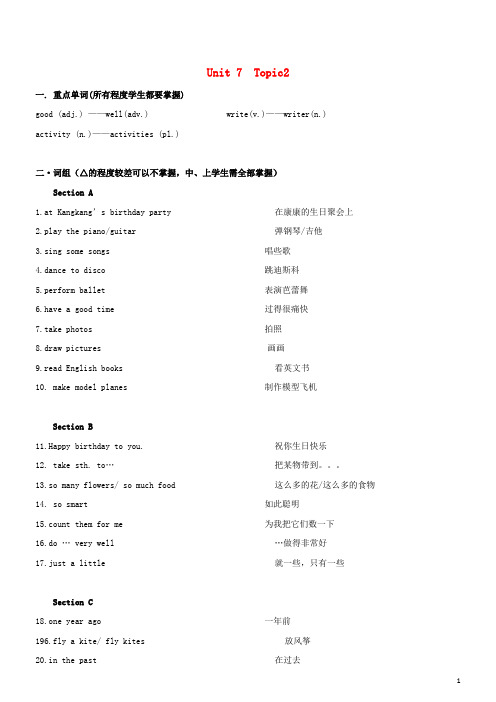
Unit 7 Topic2一. 重点单词(所有程度学生都要掌握)good (adj.) ——well(adv.) write(v.)——writer(n.)activity (n.)——activities (pl.)二·词组(△的程度较差可以不掌握,中、上学生需全部掌握)Section A1.at Kangkang’s birthday party 在康康的生日聚会上2.play the piano/guitar 弹钢琴/吉他3.sing some songs 唱些歌4.dance to disco 跳迪斯科5.perform ballet 表演芭蕾舞6.have a good time 过得很痛快7.take photos 拍照8.draw pictures 画画9.read English books 看英文书10. make model planes 制作模型飞机Section B11.Happy birthday to you. 祝你生日快乐12. take sth. to…把某物带到。
13.so many flowers/ so much food 这么多的花/这么多的食物14. so smart 如此聪明15.count them for me 为我把它们数一下16.do … very well …做得非常好17.just a little 就一些,只有一些Section C18.one year ago 一年前196.fly a kite/ fly kites 放风筝20.in the past 在过去st year/next year 去年/明年Section D22.live in London 住在伦敦23. at the age of five 在五岁时24. a few words 一些单词25. not… any more 不再,再也不26. with sb’s help =with the help of sb. 在某人的帮助下27 her first book 她的第一本书28. want to be…想要成为…三.重点句子(所有程度学生都要掌握)Section A1. Oh, do you want to sing Chinese songs or English songs?哦,你想唱中文歌曲还是英文歌曲?此句是选择疑问句,即提供两种或两种以上情况以供对方选择。
仁爱版英语七年级下册Unit7Topic2知识点总结
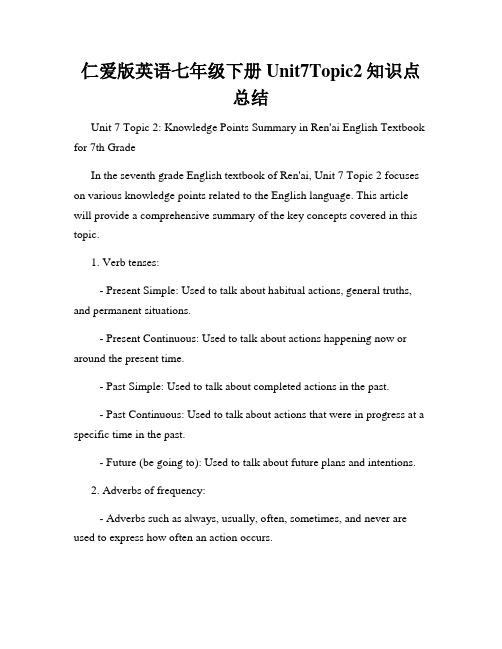
仁爱版英语七年级下册Unit7Topic2知识点总结Unit 7 Topic 2: Knowledge Points Summary in Ren'ai English Textbook for 7th GradeIn the seventh grade English textbook of Ren'ai, Unit 7 Topic 2 focuses on various knowledge points related to the English language. This article will provide a comprehensive summary of the key concepts covered in this topic.1. Verb tenses:- Present Simple: Used to talk about habitual actions, general truths, and permanent situations.- Present Continuous: Used to talk about actions happening now or around the present time.- Past Simple: Used to talk about completed actions in the past.- Past Continuous: Used to talk about actions that were in progress at a specific time in the past.- Future (be going to): Used to talk about future plans and intentions.2. Adverbs of frequency:- Adverbs such as always, usually, often, sometimes, and never are used to express how often an action occurs.- They are usually placed before the main verb, except when the main verb is "to be." In that case, the adverb is placed after "be."3. Comparatives and superlatives:- Comparatives are used to compare two things, while superlatives are used to compare more than two things.- Comparatives are formed by adding "-er" to short adjectives or using "more" before long adjectives.- Superlatives are formed by adding "-est" to short adjectives or using "most" before long adjectives.4. Quantifiers:- Quantifiers are words or phrases used to specify the quantity or amount of something.- Some common quantifiers include much, many, a lot of, a few, a little, and some.- They can be used with countable and uncountable nouns, but the choice of quantifier depends on the noun.5. Modal verbs:- Modal verbs are auxiliary verbs that express ability, possibility, necessity, or permission.- Common modal verbs include can, could, may, might, must, should, and would.6. Question forms:- There are two types of questions: yes/no questions and information questions.- Yes/no questions are formed by inverting the subject and the helping verb.- Information questions are formed by placing the question word at the beginning of the sentence.7. Direct and indirect speech:- Direct speech is when we report someone's words exactly as they were spoken.- Indirect speech is when we report someone's words indirectly, without using their exact words.- When changing from direct to indirect speech, tenses, pronouns, and time references often need to be adjusted.8. Prepositions of time and place:- Prepositions such as on, at, and in are used to express time and place relationships.- "On" is used with specific days, "at" is used with specific times, and "in" is used with months, years, and longer periods.- Prepositions of place, such as "in," "on," and "at," indicate where something is located.This summary provides a brief overview of the key knowledge points covered in Unit 7 Topic 2 of the Ren'ai English textbook for seventh graders.By understanding and practicing these concepts, students can enhance their English language skills and improve their proficiency in communication.。
()七年级英语下册Unit7TheBirthdayParty导学案(新版)仁爱版
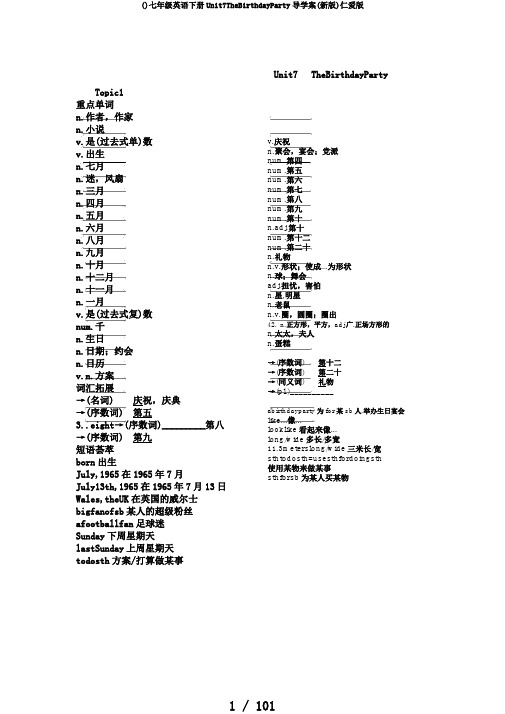
Unit7 TheBirthdayPartyTopic1重点单词n.作者,作家n.小说v.是(过去式单)数v.出生n.七月n.迷,风扇n.三月n.四月n.五月n.六月n.八月n.九月n.十月n.十二月n.十一月n.一月v.是(过去式复)数num.千n.生日n.日期;约会n.日历v.n.方案词汇拓展→(名词) 庆祝,庆典→(序数词) 第五3..eight→(序数词)_________第八→(序数词) 第九短语荟萃born出生July,1965在1965年7月July13th,1965在1965年7月13日Wales,theUK在英国的威尔士bigfanofsb某人的超级粉丝afootballfan足球迷Sunday下周星期天lastSunday上周星期天todosth方案/打算做某事v.庆祝n.聚会,宴会;党派num.第四num.第五num.第六num.第七num.第八num.第九num.第十n.adj.第十num.第十二num.第二十n.礼物n.v.形状;使成...为形状n.球;舞会adj.担忧,害怕n.星,明星n.老鼠n.v.圈,圆圈;圈出42.n.正方形,平方,adj广.正场方形的n.太太,夫人n.蛋糕→(序数词)第十二→(序数词)第二十→(同义词)礼物→(pl.)__________abirthdayparty为for某sb人.举办生日宴会like...像...looklike看起来像...long/wide多长/多宽11.3meterslong/wide三米长/宽sthtodosth=usesthfordoingsth使用某物来做某事sthforsb为某人买某物句型集锦1.—Whenwassheborn?她出生在何时?—ShewasborninJuly,1965.她出生在1965年7月。
2.—Wherewassheborn?她出生在什么地方?—InWales,theUK.英国的威尔士。
注意:Whenandwherewassheborn?她出生在何时何地?ShewasborninWales,theUKinJuly,1965.她于1965年7月出生于英国的威尔士。
仁爱版英语七年级下册Unit7TheBirthdayParty全单元导学案附复习练习讲解
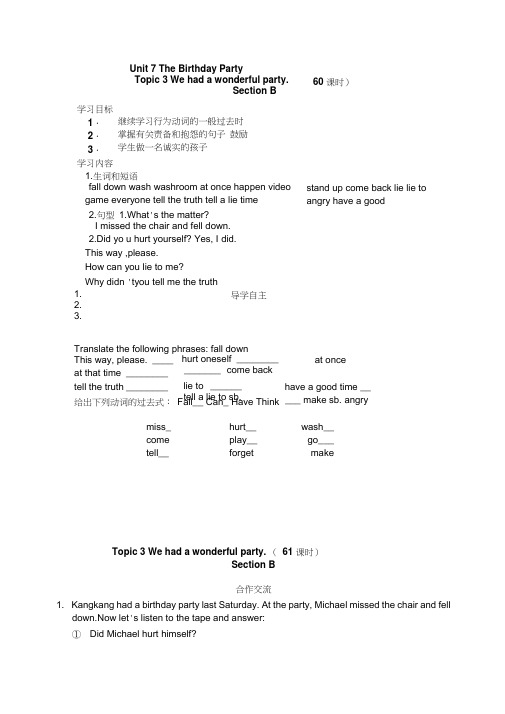
Topic 3 We had a wonderful party. ( 61 课时)Section B合作交流1. Kangkang had a birthday party last Saturday. At the party, Michael missed the chair and felldown.Now let 's listen to the tape and answer:① Did Michael hurt himself?Unit 7 The Birthday PartyTopic 3 We had a wonderful party.Section B60 课时)学习目标 1. 2. 3. 学习内容 继续学习行为动词的一般过去时 掌握有关责备和抱怨的句子 鼓励学生做一名诚实的孩子 1.生词和短语fall down wash washroom at once happen video game everyone tell the truth tell a lie time 2.句型 1.What 's the matter?I missed the chair and fell down. 2.Did yo u hurt yourself? Yes, I did. This way ,please.How can you lie to me?Why didn 'tyou tell me the truth 导学自主 stand up come back lie lie to angry have a good1. 2. 3. Translate the following phrases: fall down This way, please. ____ at that time ________ tell the truth ________ 给出下列动词的过去式: Fall__ Can_ Have Think hurt oneself ________ _______ come back lie to ______ tell a lie to sb. at once have a good time __ ___ make sb. angry miss_ come tell__ hurt__ play__ forget wash__ go___ make②Where did he want to go?2. Two students a group and act out 1a班级展示A、展示合作交流1B、展示合作交流23. 短文填空:At Kan gka ng ' birthday party, his frie nds played a game. Michael missed the chair and________ dow n. He couldntsta nd up. Did he hurt ______ ? No, he ______OK. Hishands got dirty. He had to wash them. He wan ted to go to the washroom. Kan gka ng____ him the way.C、Part 2 Listen and answe①Did Judy lie to her father?②Why did she come back late last night?质疑探究用所给动词的适当形式填空:1. Judy _____ (lie) to her father this mornin g. It ____ (make)her father very an gry.2. Michael ______ (fall)dow n but he ______ (not hurt) himself.3. Judy _____ (come) back late last ni ght. Her father ____ (th ink) she played video games.四、总结,生成新问题。
仁爱版七年级英语下册Unit7Topic2SectionA说课稿
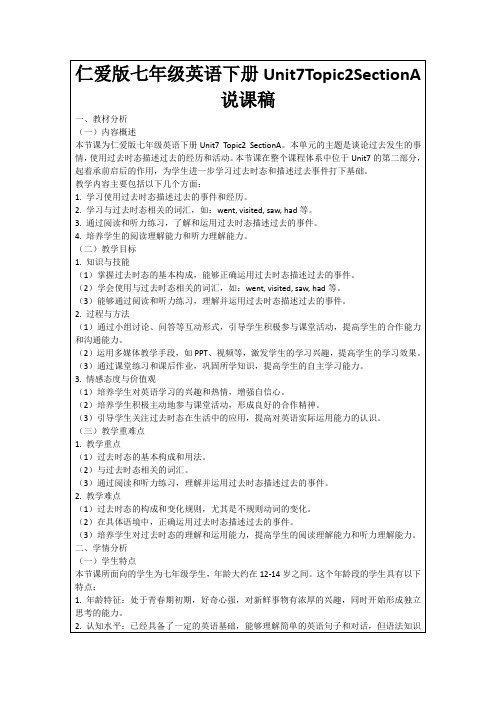
本节课所面向的学生为七年级学生,年龄大约在12-14岁之间。这个年龄段的学生具有以下特点:
1.年龄特征:处于青春期初期,好奇心强,对新鲜事物有浓厚的兴趣,同时开始形成独立思考的能力。
2.认知水平:已经具备了一定的英语基础,能够理解简单的英语句子和对话,但语法知识和语言运用能力尚需提高。
为了激发学生的学习兴趣和动机,以下策略或活动将被采取:
1.创设情境:通过设计有趣的生活场景,让学生在真实的语境中运用过去时态,提高学习的实际意义。
2.游戏化教学:运用游戏、竞赛等互动形式,激发学生的竞争意识和学习兴趣。
3.多媒体辅助:使用多媒体工具展示生动的图片、视频等,增强视觉效果,吸引学生的注意力。
(3)通过课堂练习和课后作业,巩固所学知识,提高学生的自主学习能力。
3.情感态度与价值观
(1)培养学生对英语学习的兴趣和热情,增强自信心。
(2)培养学生积极主动地参与课堂活动,形成良好的合作精神。
(3)引导学生关注过去时态在生活中的应用,提高对英语实际运用能力的认识。
(三)教学重难点
1.教学重点
(1)过去时态的基本构成和用法。
仁爱版七年级英语下册Unit7Topic2SectionA说课稿
一、教材分析
(一)内容概述
本节课为仁爱版七年级英语下册Unit7 Topic2 SectionA。本单元的主题是谈论过去发生的事情,使用过去时态描述过去的经历和活动。本节课在整个课程体系中位于Unit7的第二部分,起着承前启后的作用,为学生进一步学习过去时态和描述过去事件打下基础。
(二)媒体资源
在教学中,我将使用以下教具、多媒体资源或技术工具:
1. PPT:展示本节课的教学内容、重点和难点,帮助学生理解和记忆。
仁爱英语七年级下册Unit7 Topic 2 Section A教案新部编本
教师学科教案[ 20 – 20 学年度第__学期]任教学科:_____________任教年级:_____________任教老师:_____________xx市实验学校仁爱英语七年级下册Unit7 Topic 2Section A教案The main activities are 1a and 3.本课重点活动是1a和3。
Ⅰ. Teaching aims and demands 教学目标1. Learn some useful words and expressions:take photos,row, skate2. Learn "can" and "can’t" for ability and inability:(1)—Can you sing Chinese songs at Kangkang’s birthday party?—Yes, I can.(2)—Can you play the guitar?—No, I can’t.(3)—Can you dance?—Yes, I can.(4)—Can you take photos?—Yes, I can.(5)I can’t sing any Chinese songs.Ⅱ. Teaching aids 教具实物/卡片/挂图/录音机Ⅲ. Five-finger Teaching plan 五指教学方案Step 1 Review 第一步复习(时间: 10分钟)1.(让学生以小组为单位,复习以前学过的动词短语。
)(学生四人为一小组,列出已学过的动词短语,看哪一小组写得最多。
) T: Work in groups. Write as many verb phrases as you can. Let’ s see which group can write the most phrases. One phrase one point.Now, let’s begin.(每组写完后,派一个代表向全班同学汇报,然后老师把这些词组板书在黑板上。
仁爱版七年级下册Unit7Topic2SectionA教学教材
4. — Can you sing Chinese songs_C___ English songs?
— English songs.
A and B in C or D with
5. Sam ____
can dance guitar.
_A___
music
and
play
A to, the B to, / C for, the D for, /
5. — 你会跳迪斯科吗? — 是的,我还会表演芭蕾。 — Can you _d_a_n_c_e __to___ d_i_s_co_ ? — Yes. I can __a_ls_o_ perform ballet.
二、单项选择。 1. What would you like to perform__A__
三、 句型转换
1. I can play the piano.(改为一般疑问句,再 作否定回答)
__C_a_n_ _yo_u___play the piano? _N_o_, __, _I____ca_n_’t__. 2. He can spell the new word.(否定句) He _c_a_n_’t _s_p_e_ll the new words. 3. I want to sing English songs at the party. I _w_o_u_ld__lik_e_ _to___ sing English songs at the party. 4. I have a good time at the party.(同义句) I can __e_n_jo_y _m_y_se_l_f _ at the party.
5. What other things can you do?(同义句)
新仁爱版七年级英语下册Unit7 Topic2 SectionC教学设计
Unit 7 The Birthday PartyTopic 2 2. I can dance and play the guitarSection C教学设计授课班级:七(5)班课题:仁爱版七年级下册Unit 7 The Birthday Party Topic 2 Can you sing an English song? Section C课型:阅读课Analysis of the teaching material 教材分析:本话题是Unit 7 The Birthday Party的第二话题,主要围绕情态动词can谈论个人能力。
Section C围绕户外活动展开话题,复习巩固情态动词can的用法,进一步学习can的过去式could的用法,学生能够谈论过去和现在能做和不能做的事情。
通过话题的讨论,培养学生只要肯努力,万事皆有可能的生活和学习态度。
Analysis of students 学情分析:本课所教授学生为七(5)班学生,在上学期的初中英语学习之后,有了一定的英语学习方法养成;学生对新生事物兴趣浓厚,上课积极性高,愿意向其他同学分享自己的经历;整体学生的基础较好,但有小部分学生对新知识的接受能力较弱,应该多关注这部分学生。
在Section A和Section B已经学习过情态动词can的用法,并且谈论过个人能力,为Section C进一步巩固学习本话题和could的用法打下了基础。
Teaching goals教学目标1.知识目标:(1)Master the words and phrase:ago, could and couldn’t.(2)Pay attention to the difference between both and all .2. 能力目标:Talk about the topic of ability.Mater the use of could and couldn’t.3.情感目标:Enhance students’ awareness of hard study.II. Teaching key and difficult points教学重难点1. Key points:(1)Help students understand the use of could and couldn’t. (2)Encourage students to talk about the topic of ability.2. Difficult points:How to make sentences with could and couldn’t.Learning methods学习方法:竞争策略,小组合作学习策略Teaching methods 教学方法:竞赛法,交流法,综合运用情景法等Teaching aids教学手段:多媒体教学Teaching processions教学过程板书设计:Unit 7 The Birthday PartyTopic 2 Can you sing an English song?Section C词汇:ago / ə’gəu /adv. 以前,之前two years ago one month ago句型:She can fly kites very well now. But one year ago, she couldn’t do it at all.G1G2G3G4。
仁爱版七年级英语下册教案Unit7Topic2SetionB新授课教案
自学要求:通过自编对话,巩固Can引导的选择疑问句和a little , very well的用法。
自学检测3:
课本68中第三题
•当堂训练
单项选择。
1.—Can you draw or sing ?
—I can draw. I can do it _____
A few B little C a few D a little
3、中招考点:
情态动词can could在陈述句一般疑问句、选择疑问句中的用法。
4、学情分析:
本班学生英语学科基础较差,部分学生学习兴趣不是很足,本课生词量大,不好掌握。
情态动词can could学生容易理解,但容易出错,应该大量练习。
二、学习目标
1、会读会写P65—66的生词、短语。
2、巩固can/can't的用法,继续学习Can开头的一般疑问句、选择疑问句。
4.--- _____ you make cards ?
--- Of course .I can .
A Do B Are C Can D How
5.Can he read English books?
No. He _____
A can B can’t C does’t D isn’t
2、针对目标2,能够熟练做题。
自学指导二
•1.自学内容:课本P65的1a对话。
•2.自学方法:先听1a录音,然后同桌之间分角色朗读1a,互相正音。再精读1a。
•3.自学时间:8分钟。
•4.自学要求:。通过理解关键词和短语,能自己复述和翻译1a短文并完成1b。
自学检测:二
65页1b部分
自学指导三:
自学内容:课本65页2
- 1、下载文档前请自行甄别文档内容的完整性,平台不提供额外的编辑、内容补充、找答案等附加服务。
- 2、"仅部分预览"的文档,不可在线预览部分如存在完整性等问题,可反馈申请退款(可完整预览的文档不适用该条件!)。
- 3、如文档侵犯您的权益,请联系客服反馈,我们会尽快为您处理(人工客服工作时间:9:00-18:30)。
精品文档Topic 2 Can you sing an English song?Section A一、学习目标和要求. 语法精要:A、情态动词can / can't 的用法。
B、选择疑问句的用法:eg: Can you dance or draw? I can dance.1.必会主要生词和短语学习目标dance to disco, perform ballet, play the guitar, have a good time, play the piano2.必会主要句型--Do you want to sing Chinese songs or English songs?-------Chinese songs.--Can you dance to disco or perform ballet?------------I can dance to disco.(二)、本节课的学习要点及考点1. What else can you do? 你还会做什么呢?Else意为“别的,其他的”,常用在疑问代词who, what, …,疑问副词how, when, why, where…和不定代词somebody, anything…之后,做后置定语或状语。
如:Anything else can I do for you? 我还能为你做些别的事吗?What else would you like? 你还想要什么?2.—Can you dance to disco or perform ballet? 你时会跳迪斯科还是会表演芭蕾舞?---I can dance to disco.我会跳迪斯科。
选择疑问句时指提供两种或者两种以上的情况以供对方选择的疑问句,选择疑问句有两种形式----可供选择的选项由or连接,,回答形式不用Yes或No,而是直接选择答案。
如:--Would you like milk or tea? 你想要牛奶还是茶?--Milk, please.牛奶。
—Can you dance to disco or perform ballet? 你时会跳迪斯科还是会表演芭蕾舞?---I can dance to disco.我会跳迪斯科。
3. I'm sure we'll have a good time at the party. 我确信我们在聚会上玩得很高兴。
(1)sure意为“深信的,确信的,对……由把握”,主语必须是人。
结构为:Be sure(2)have a good time意为“玩得开心”,这是一个固定短语,其意思等同于have a great /nice /wonderful time(3)。
—Can I eat them? 我可以吃它们吗?---No way! 没门(妄想)。
--Can I borrow your bike? 我能借你的自行车吗?--No way. 不行。
四、达标测评1. 把下列短语译成汉语。
玩得开心______________ 随着迪斯科跳舞______________弹吉他______________ 在康康的生日宴会上______________弹钢琴______________ 唱中文歌曲______________表演芭蕾______________ 确定______________唱英文歌曲______________ 在聚会上______________精品文档.精品文档没门_________________照相_______________制作飞机模型_______________画画_______________Take 的用法小结:照相_________ 带某人去某地________ 乘坐交通工具________1.Can you swim?--No, I ____. A. can B. can't C. don't2. Can you play ___? A. the guitar B. guitar C. a guitar3. She can sing but she ___ dance. A. can B. can't C. doesn't4. Maria can _______ ballet. A. to perform B performs C. perform5.--Can you dance? --___. A. Yes, I can. B. No, I can. C. Yes, I can't句型转换1. I can sing English songs.(一般问句)____ you_______ English songs?2. Can she speak Chinese?(否定回答)____, she _____.3. Lucy can ride a bike.(提问)_____ can Lucy _____?4. His uncle can draw .(否定句) His uncle _____ _____.5.Do you come from China or Japanese?(用China回答)_________________________________________6.Is your mother a teacher? (用or worker 改写成选择疑问句)___________________________________________________?Section B一、学习目标和要求1.必会主要生词和短语parrot, smart, count, take…to…so many2.必会主要句型Can you …? Yes, I can./No, I can't.What can you do?--Can you sing an English song?--------Of course I can.--What else can you do?--I can count. ---------You are so smart!2.继续学习情态动词can/can't的用法,巩固Can/can't 表个人能力的功能用语。
三、学习过程(一)复习上节课的学习要点及考点情态动词can的用法:情态动词can 的用法:后跟动词___,一般疑问句把can_______.否定can后____.(二).检测单词及词组:聪明的_______ 数数________ 如此多的_______ 你很聪明________ 画画__________ 做模型飞机________(三)、翻译下列短语和句子1.祝你生日快乐_____________2.给/为我数他们_________________3.如此聪明_____________4.带这些花去聚会_____________如此多_____________ 把…带到…_____________5唱一首英文歌____________ 6 还有什么____________(二)、预习P65 1a 回答下列问题:精品文档.精品文档______________________________1.Can Polly speak English?2 . Can Polly count one, two, three...?______________________________1.Listen to 1a and answer the following questions:1 Can Polly sing an English song? ______________________________2 What do you think of Polly?__________________________________3 Can Polly count the flowers? __________________________________________4 Why or why not?__________________________________________(三)完成填空Polly is a parrot. It can ______English. It_____ sing the song Happy Birthday . It can_______one, two, three, four…..______ are the party. There Jane wants to______the flowers to It is so _____.flowers . It _____ count them.。
2.小组内进行表演1a 展示对话3.我想1. I'd like to take these flowers to the party.四)、本节课的学习要点及考点( 带这些鲜花去参加聚会。
的区bringtake与带某人/某物去……”。
这里要注意Take sb. /sth. to …意为“之意,它们之后都可以接表示人或物的名词作宾语。
其区”“带,拿别,二者都有则指从说话处把某人take”;”或“拿来别在于:bring指从别处把某人或某物“带来。
或“拿走”“或某物带走”My father often takes me to the zoo. 我父亲常带我去动物园。
如:When you come to school next time, bring your homework here.下次来学校时,把作业带来。
2、根据汉意完成句子can you do? What ____1. 你还会做什么?2. Can Mr. Wang speak English?)一点( Yes, he can .He can speak____ ____.I'd like to ____these flowers___ the party.3. 我想把这些花带到聚会上去math problems?Can you ______________ 4. 你会算数学题吗?假going to Kunming for the holidays(—Lucy, tomorrow is October 1st. I'm ( )1.). 日_____ —D.Thank you. C.Don't tell me. A.That's OK. B.Have a good time. Lucy, can you draw?)2.—(_____ But I can sing Chinese songs. —D.Yes, I can. A.No, I can. B.No, not at all. C.Yes, I can't.Mom, can I have more chocolates? —)3.(_____ You can't eat too much.—D.Yes, C.No way! A.That's all right! B.That'sOK!Can Bill _____ the party? —you can. ( )4.Of course, he can. —e toes to es eI can play ping-pong. —)5.—Can you play ping-pong _____ basketball? (D.withC.but A.and B.or精品文档.精品文档()6________ can he do? He can also play the piano. .A. What.B. What else.C. What other .()7 Can I have a look at the soccer ball? ________. It's time for class. A. No, you can't. B. Yes, you can. C. .No, I can't .()8 Can I take these apples to my home? ________.A. No way!B. No ,ways.C. This way , please.()9 Would you like ________ the disco at the party? Yes, I'd like to.A. dance.B. dancingC. to dance()10Can you ________ a model plane? Yes, I can.A. do.B. make.C. count .()11Meimei can ride a bike this year, ________ she couldn't ride a bike two years ago.A. and.B. soC. but.()8. Can he sing or play the guitar? ________A. He can play the guitar.B. No, he can't.C. Yes, he can根据汉语提示完成句子。
